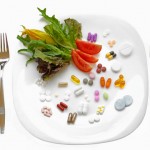Every five y ears, the United States Department of Agriculture (USDA) and the Department of Health and Human Services (HHS) release dietary guidelines. These guidelines outline what the USDA and HHS consider to be the and how much of them a typical person must consume in order to maintain a healthy diet. The changes to these guidelines are generally small; the principles of healthy eating have been established for many years. But, this year, one of those small changes is actually a significant signal of a change in the way that the health community is starting to think about dietary supplements.
ears, the United States Department of Agriculture (USDA) and the Department of Health and Human Services (HHS) release dietary guidelines. These guidelines outline what the USDA and HHS consider to be the and how much of them a typical person must consume in order to maintain a healthy diet. The changes to these guidelines are generally small; the principles of healthy eating have been established for many years. But, this year, one of those small changes is actually a significant signal of a change in the way that the health community is starting to think about dietary supplements.
For many years, the USDA and HHS have insisted that you can get all of the nutrition you need through the food you eat; that you don’t need to take supplements. While this is technically true, the simple fact is that many people still fail to eat the right foods to deliver all of the nutrients that they need. In fact, the poor may not be able to afford to regularly purchase and cook foods that will provide the most nutrition. Afraid that people would begin to use dietary supplements as an excuse to stop buying and eating healthful foods, the USDA and HHS emphasized getting the nutrition that you need through the food you eat.
While their emphasis still points in that direction, the dietary guidelines that the USDA and HHS released on January 31, 2011, show a concession to the health supplement industry: the guidelines admit that taking dietary supplements can help people to get the nutrients that they need if the food they eat is lacking it. They still advocate getting all of your nutrition from the food you eat if it’s possible, but it no longer discounts the value of bolstering your nutrition with dietary supplements.
It’s easy to understand why the USDA and HHA were so reluctant for so long to acknowledge the benefits of dietary supplements: they felt that doing so would come with a huge risk of people trying to live off supplements in an attempt to lose weight, or eating unhealthful but cheap or tasty meals and taking supplements in an attempt to counteract the adverse affects of eating food that’s bad for them. But it’s nice to see the USDA and HHA admitting, however cautiously, that there is some value to supplements. If used appropriately, they can make a healthy diet even healthier.